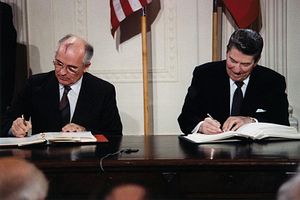Is it time to withdraw from the Intermediate Nuclear Forces Treaty? The Trump administration apparently thinks so, and reportedly will indicate to Russia its intention to withdraw from the treaty in the next weeks.
The case against the INF has been building for some time. A recent addition to the argument came from Colin Gray and Matthew Costlow, the latter an analyst and graduate student, and the former one of the premier strategic thinkers working today. They are hardly the first to make the argument, however; a combination of Russian and U.S. infractions, the growth of Chinese power, and changes in the nature of the U.S.-Russian relationship have served to suggest that the treaty has outlived its usefulness.
The case against the treaty depends on three related arguments. The first is that Russia has not maintained its obligations under the treaty, and instead has worked on and tested systems that violate its obligations. For its part, Russia has made counter-claims about U.S. compliance. The second is that, while the treaty undoubtedly reduced tensions between NATO and the Warsaw Pact in the 1980s, the strategic situation has shifted such that the specific prohibitions no longer have the relevance they once did. The third—and perhaps strongest—argument in favor of abrogating the treaty is that it does not apply to China, and that China has taken advantage of this gap by developing a wide array of systems that the United States is formally prohibited from deploying.
Argument in favor of the treaty make the case that it remains central to the tapestry of treaties that defused tension in the Cold War, and that abrogating the treaty now would worsen the rupture in U.S.-Russia relations. Moreover, the United States has alternative capabilities (primarily ship and submarine-launched cruise missiles) that can fill the roles that the prohibited missiles would likely play. Finally, eliminating the treaty would take the lid off Russian missile development, and allow Moscow to pursue a lasting advantage in such systems.
These latter arguments are well-taken, but Colin Gray, Harry Harris, Eric Sayers, and others make strong points. Since Russian violations of the treaty came into focus, the United States has in effect unilaterally restricted its development of intermediate -ange cruise and ballistic missiles, while its two largest rivals have invested heavily in precisely those systems. Moreover, restraining Russian hard power is not nearly as important as it was in the 1980s. Notwithstanding ongoing tensions between Russia and NATO, and between Russia and the United States, no one seriously doubts that the US and NATO have, or easily could have, a presumptive military advantage. It makes little sense for the United States to hold to a treaty of mutual military restraint with what amounts to a second-rate military power.
Could China be convinced to join the INF? On its face this seems like an ideal solution, but China’s GLCMs and IRBMs are central to its defense strategy in the Pacific, and are currently the only way that China can offset huge U.S. sea, space, and air advantages. The chances that China would agree to restrict itself from developing such weapons without any kind of mutual trade with the United States seem bleak. Indeed, the only thing that might convince China to join the treaty might be the development of an array of systems by the United States that China found threatening. But this would require the United States to throw off the current restrictions of the INF regime.
Arms control is a worthwhile endeavor, and existing arrangements should not be thrown aside without careful thought. But arms control agreements reflect and manage specific strategic realities, based on foundational power relationships that undergird the international system. When those power relationships change, the utility of any specific agreement also changes. A desire to refight the arms control wars of the 1980s should not obscure this fact.
The views expressed here are his personal views and do not necessarily reflect those of the Department of Defense, the U.S. Army, the Army War College, or any other department or agency of the U.S. government.
































